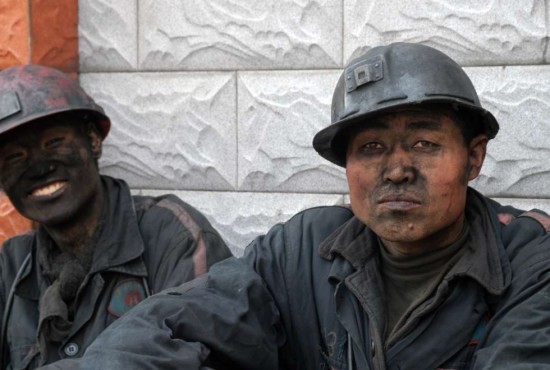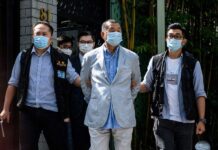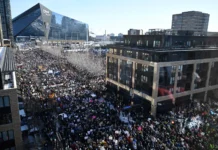Wave of repression – over 30 mineworkers arrested after Shuangyashan strike
Dahu, chinaworker.info
The so-called ‘Shuangyashan incident’ – a six-day strike by around 10,000 coal miners in March – has shaken the dictatorship of the CCP (Chinese Communist Party). It has also, predictably, brought forth a wave of repression.
In the city of Shuangyashan itself, with a population of just over 1 million, over 30 workers have been arrested on suspicion of organising the strike and street protests. The city’s Public Security Bureau has reportedly circulated a ‘wanted list’ with photographs of 75 people they want to detain.
“We are not rioters”
The crackdown in this city close to China’s border with Russia is a reminder of the high stakes for workers in China if they engage in strikes or industrial action. This is the case even though – as in most other strikes in China – workers are only demanding to be paid for their labour.
“We are not rioters, we simply want to get back what we have worked so hard for,” one Heilongjiang mineworker told Hong Kong’s South China Morning Post.
In the case of the Shuangyashan miners, employed by the giant Longmay Group which is owned by the government of Heilongjiang province, some workers are still owed wages from 2014. In a political system where unions are illegal and protest of any kind is punishable by severe repression, workers have many risks to weigh up before taking strike action. Nevertheless, the number of strikes has increased dramatically. Strikes last year more than doubled from the previous year, to almost 2,800. Four-fifths of all strikes were concerned with recovering unpaid wages.
The CCP regime has stepped up its repression against workers. It fears the growth of workers’ self-organisation and an independent labour movement more than any other challenge to its rule. Last year it initiated a province-wide crackdown on labour rights activists and NGOs in Guangdong province. In Sichuan province recently the authorities went a step further, publicly parading and shaming eight construction workers in retribution for a strike they organised last year. News of this punishment created outrage from right-minded people on social media.
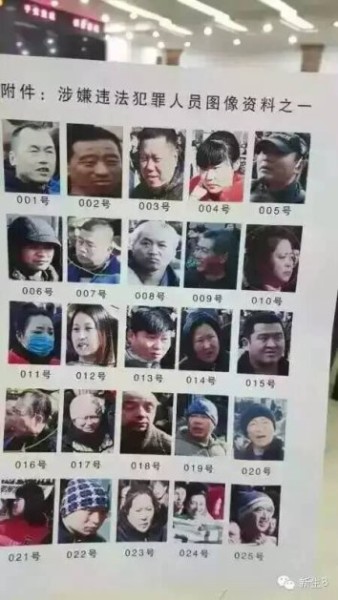
Shuangyashan is just the start
The strike in Shuangyashan was not an isolated outbreak. There were also strikes in other areas by workers similarly facing non-payment of wages. Due to extensive media censorship in China, many workers are completely unaware that other workers may also be involved in similar struggles. This censorship is an important part of the regime’s arsenal against strikes. They want to prevent bigger conflagrations that spill across more than one region. According to Mimi Lau in the South China Morning Post, at more or less the same time as the Shuangyashan strike, “Thousands of workers from the Tonghua Iron and Steel Group in Jilin province, Qiqihaer in Heilongjiang, Kaiping in Heibei, and Pingxiang in Jiangxi, demonstrated over unpaid wages…”
The Shuangyashan strike is one of the most important developments since Xi Jinping came to power. This is because it erupted during the National People’s Congress (NPC) meeting, causing the government maximum embarrassment (despite media censorship it became a hot talking point on social media). The strike is also widely seen – and correctly so – as a sign of what is coming in China. Workers and communities that are being thrown on the scrapheap by the CCP leaders and their right-wing ‘supply-side’ economic nostrums will fight back. Shuangyashan is just the start!
Six million jobs in the state-owned sector are at risk in the next five years. The government plans to close 5,600 coal mines by 2020, with 1,000 to shutdown this year alone.
CPP punishes the victims
The CCP uses a carrot-and-stick tactic to contain and defeat strikes and mass protests. But the ‘stick’ of police repression is always bigger than the ‘carrot’ of concessions. Often the promises that CCP officials make in the heat of the moment to get workers to disband their protests turn out to be worth a lot less than first claimed. Sometimes, the promises are broken altogether. We are seeing something similar in the case in Shuangyashan.
Longmay bosses, under the pressure of the CCP leaders during the NPC session, began paying the wage arrears with an initial 2-month payment made immediately and a promise of more to follow. But now many workers report that the payments have been subject to a variety of arbitrary reductions. In some cases workers say that 50 percent of their wages have been deducted.
The Shuangyashan strike, involving several of Longmay Group’s 40 coal mines, began when provincial governor Lu Hao said during the NPC that, “Longmay has 80,000 workers down mines, and today, not one has not been paid monthly wages and their income hasn’t fallen a penny.”
Lu’s comments triggered an explosion of anger among Longmay workers. This is reflected in the banners on the Shuangyashan demonstrations which proclaimed, “Lu Hao tells blatant lies,” and “CCP, give us back our money!”
Therefore if the authorities truly want to apprehend the ‘black hands’ who initiated the strike they should arrest Lu Hao, his fellow CCP officials, and the Longmay managers. They are responsible for this situation. What a disgrace that striking workers face severe trumped-up criminal charges (“gathering a crowd to disturb public order,” and “picking quarrels” for example) while the Longmay bosses are not punished for stealing from their workforce! What double-standards – using the ‘law’ to punish the victims and protect the criminals!
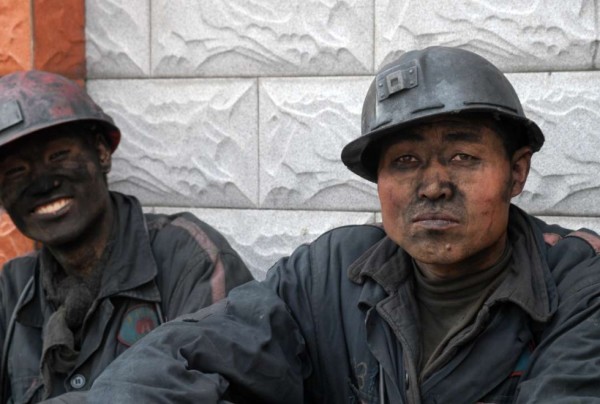
White terror will backfire
The regime’s attempt to stamp out workers’ protests with white terror will backfire. The whole of northeast China (and not only the northeast) is facing mass factory closures and an epidemic of unpaid wages. Longmay is just one of a host of companies – private and state-owned – that is buried in debts and plans huge layoffs.
Workers and whole cities are now being sacrificed for the profits of the capitalists and to restore the ‘credit worthiness’ of the big banks (also needed to insure the capitalists can make profits). The anger that is boiling up in these regions of China can explode in huge movements in the coming period. As one mineworker suffering months of unpaid wages told Lau of the South China Morning Post: “What do you want me to say? The urge to kill those who have exploited us comes to mind every time I think about my wages.”
The CCP’s repression can only have a partial and temporary effect – like bombing the clouds to cause rain. The government’s economic policies are sowing the seeds of massive class battles and in the longer term the repression and victimisation of strike organisers will only intensify the anger of the working class.
chinaworker.info says:
- Release all those arrested in connection with the Shuangyashan strike!
- Stop the white terror against Chinese workers!
- Workers should not pay for the crisis caused by the CCP and the billionaires – for independent trade unions and a socialist alternative!

